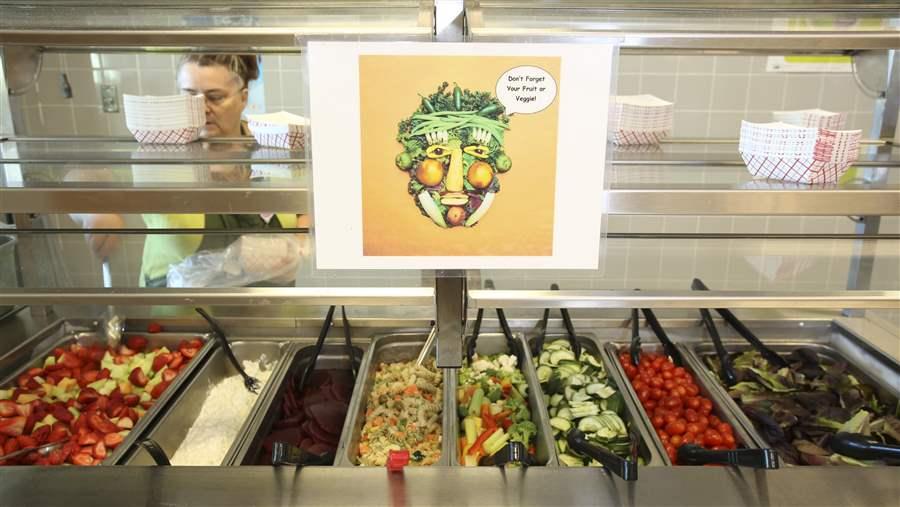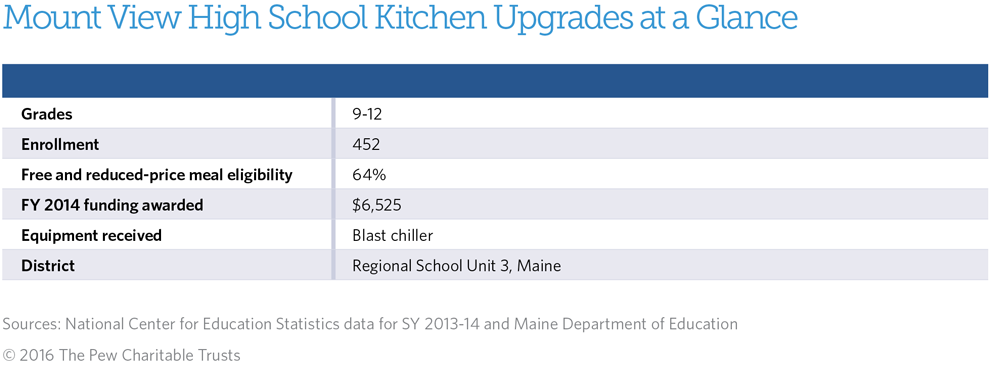Mount View High School
Thorndike, Maine
 © The Pew Charitable Trusts
© The Pew Charitable TrustsLeftover fresh fruit from the salad bar can be safely frozen in the school’s blast chiller and turned into healthy smoothies, resulting in less food waste.
The student nutrition program in Maine’s Regional School Unit 3 (RSU 3) serves children in 11 rural communities between Augusta and Bangor, with a focus on locally grown ingredients, including beef from cattle raised across the road from Mount View High School. Nutrition director Allison Daugherty forged partnerships with 13 area farms that supply about 40 percent of the district’s food. The wide selection of delicious and healthy local ingredients and meals prepared from scratch has encouraged more children to participate in meal programs in recent years, but the district could not have had so much success without a key equipment upgrade in its central kitchen at the high school.
RSU 3 is able to take full advantage of Maine’s short annual harvest thanks to a grant from the U.S. Department of Agriculture, which enabled the district to purchase a blast chiller. The appliance can freeze even hot foods in a few hours, achieving subzero temperatures rapidly enough to preserve most nutrients, reduce spoilage, and meet health code requirements.
These capabilities allow Daugherty and her team to offer Maine-grown food year-round and save money. Late spring and summer crops such as blueberries, tomatoes, and zucchini, which the district could not easily use before, are now received while school is out and frozen for inclusion on fall and winter menus and in snacks served to elementary students through the federally funded Fresh Fruit and Vegetable Program. Similarly, the new appliance enables kitchen staff to process and freeze large quantities of locally sourced beef for future use in stews and dishes such as shepherd’s pie. This in turn allows the district to procure high-quality meat at about half the cost of equivalent products from other sources, while supporting nearby ranchers and butchers.
“We’re thrilled we get to cook with so many fresh, local foods every day and to show kids different ways to prepare and enjoy them,” says Daugherty. “The chiller’s also opened our eyes—and the students’—to opportunities to reduce food waste.” Kitchen staff found they could freeze unserved leftovers and later turn them into appealing menu items, offering another avenue for savings. For example, fresh fruit salad that would otherwise spoil is frozen and then pureed to create smoothies that are a hit with students.
The blast chiller also improves efficiency districtwide. Staff at Mount View prepare soups, casseroles, and other dishes from scratch and chill or freeze portions for distribution to schools throughout RSU 3. This centralized production process lets Daugherty easily monitor cooking techniques and frees up kitchen employees at other schools to dedicate more time and attention to customer service and nutrition education for students.







